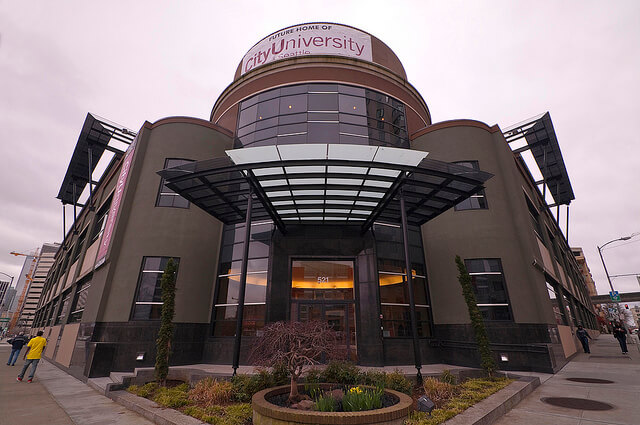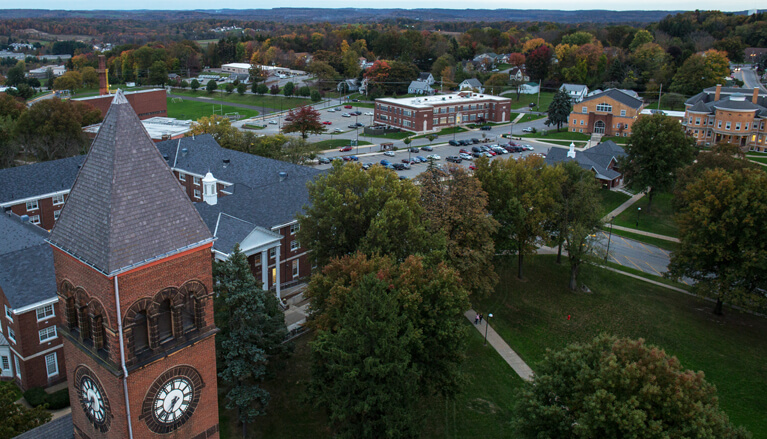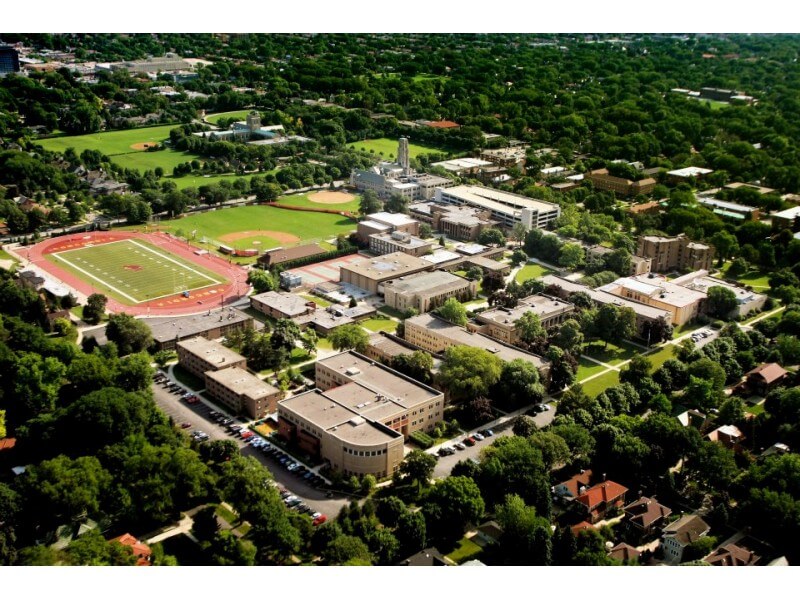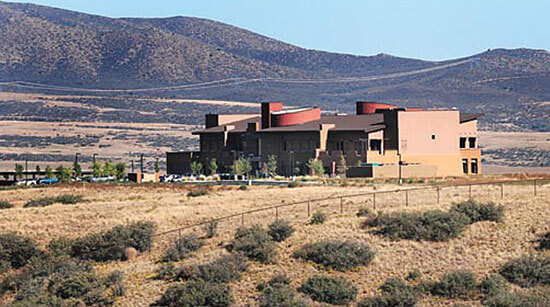Online Ed.D.
Program Home Tuition and Fees FAQ Email Coordinator Application Instructions
Elevate your career with the University of Florida’s online Doctorate of Education (Ed.D.) in Special Education, a program inspired by the principles of the Carnegie Project on the Education Doctorate (CPED). This professional practice doctorate is meticulously designed to forge expert practitioners equipped to make significant impacts as service providers, school leaders, professional development facilitators, and advocates for individuals with disabilities.

Program Overview
Our fully online Ed.D . in Special Education, a part-time degree program designed with working professionals in mind, takes approximately four years to complete. As a participant in this program, you will engage deeply with your professional practice and the broader context of your work, leveraging evidence-based strategies to foster academic and social advancements for individuals with disabilities. Our globally acclaimed special education faculty mentor students in coursework designed to support their individual career advancement goals. Students then receive one-on-one faculty mentorship in the program’s culminating research phase, an applied dissertation.
For more information about our Online Ed.D. in Special Education contact our program coordinator, Dr. Kristi Cheyney-Collante .
Ed.D. in Special Education Core Curriculum
Our carefully crafted curriculum provides a comprehensive foundation for success. Courses are delivered online , with both synchronous and asynchronous learning opportunities. The program is cohort-based, so students progress through the experience with a group of like-minded adults, who are focused on expanding their potential as leaders in special education. The program’s requirements include electives, quantitative and qualitative research courses, and dedicated dissertation hours.
Choosing Your Path: Ph.D. vs. Ed.D.
Choosing between a Ph.D. and an Ed.D. in Education requires careful consideration of academic interests and career goals. While both are doctoral degrees, they differ in emphasis.
Ph.D. (Doctor of Philosophy)
- Ideal for those aspiring to pursue research intensive careers in academia.
- Emphasizes advanced research, theory development, and scholarly contributions in education.
- Focuses on advancing knowledge and understanding of education through rigorous academic inquiry and publishing scholarly work in peer-reviewed journals.
- A good fit for students willing to relocate to UF’s main campus Gainesville, Florida. The PhD is a full time, on-campus program.
Ed.D. (Doctor of Education)
- Ideal for in-service educators and related professionals seeking leadership roles in special education and adjacent fields Offers a practice-oriented approach, focusing on applying research to real-world challenges for those working with and advocating for individuals with disabilities.
- Prepares graduates to address practical issues, drive innovation, and lead special education initiatives within schools, districts, or other organizations that serve individuals with disabilities.
Request Information
Sign up for updates about our program!
Program of Interest —Please choose an option— On-Campus Ph.D. Online Ed.D. Online M.Ed. Online Ed.S. Disabilities in Society Graduate Certificate Early Childhood Studies Graduate Certificate Dyslexia Graduate Certificate Disabilities in Society Undergraduate Minor Early Childhood Studies Undergraduate Minor Unsure
Ed.d. program curriculum.
The Doctorate of Education (Ed.D.) degree consists of 90 total credits: 30 credits are transferred from a student’s relevant master’s degree, and they obtain 60 credits through the program.
Required Courses
- EEX 7304: Introduction to Field of Inquiry in Special Education
- EEX6745: Historical and Theoretical Foundations of Disability in Education
- EEX 7303: Inquiry in Special Education: Analysis of the Literature
- EEX 6936: Professional Development for Special Educators
- EEX 6058: Family & Teacher Perspectives on Disability
- EDF 6416: Quantitative Methods for Evaluation in Educational Environments
- EEX 6936: Reading and Designing Qualitative Research
- EEX 6936: Qualitative Data Collection and Analysis
- EEX 7305: Applied Research for Scholarly Practitioners
- EEX 7981: Proposal Development
- EEX 7979: Advanced Research
- EEX 7980: Research for Doctoral Dissertation
College of Education Ed.D. Research Requirements
Areas of specialization.
- EEX 6135: Foundations of Literacy Development & Dyslexia
- EEX 6136: Dyslexia: Language and the Brain
- EEX 6137: Dyslexia: Assessment for Intervention
- EEX 6138: Dyslexia: Intervention Methods
- *EEX 6855: Dyslexia: Practicum in Assessment and Intervention (*optional)
Early Childhood Practitioner
- EEC 6205: Early Childhood Curriculum
- EEC 6933: Families in Early Childhood Education
- EEC 6933: Assessment & Evaluation in Early Childhood Educational Practice
- EEC 6933: Policy & Transition in Early Childhood Educational Practice
Early Childhood Policy
- EEC 6636: Examining Practices, Policies, and Key Issues in EC Policy
- EEC 6665: History, Child Development, and Equity in EC Policy
- EEC 6667: Theory and Analysis in EC Policy
- EEC 7056: Early Childhood Policy and Advocacy
Disability and Society
Partnership Facilitator, James Patterson Literacy Challenge , Current Ed.D. student
Program Requirement
- A bachelor’s and master’s degree from an accredited U.S. college or university in special education or a related field, or a degree deemed equivalent by the University of Florida Office of Admissions .
- A minimum grade point average of 3.0 undergraduate upper-division (last 60 credits) and graduate coursework.
Program Highlight
Entry: Fall Semester Typical Course Load: 6 credits per semester Full-Time/Part-Time: Part-Time Format: Fully Online, primarily synchronous with synchronous engagement in each course Application Deadline: February 1st Average Class Size: 12-18 Program Completion: 4 years
The Top 19 Online PhD in Special Education Degree Programs
Reviewed by Mary McLaughlin, Special Education Teacher; M.S. SpEd

Image Source
The Census Bureau reports that only 1.68 percent of U.S. adults over age 25 have finished a terminal doctorate degree. Attending graduate school for a PhD in Special Education can set you apart in the teaching field with top-level knowledge of childhood disabilities. Doctoral programs in special education develop the research and pedagogical skills required to adapt Common Core curriculum. Earning a doctorate in education leads to mean lifetime earnings at $2.80 million, which is significantly higher than the master’s-level average of $2.26 million. Advanced training can unlock jobs like special education administrator, educational diagnostician , applied behavior analyst, assistive technology specialist, and early intervention director. Some PhD graduates become tenured college faculty to train tomorrow’s special educators.
Thanks to digital technology, finishing your doctorate can happen wholly online too. We’ve devoted the following article to the Top 20 Online PhD in Special Education Degree Programs nationwide. We aligned our order with the U.S. News and World Report rankings for the best graduate online education offerings. Next, we narrowed down the list to universities offering doctoral concentrations for special education teachers primarily online. Strong preference was given to programs recognized by the Council on Accreditation of Teacher Preparation ( CAEP ) and/or Council for Exceptional Children ( CEC ). Other factors we considered were post-grad enrollment, curriculum model, academic rigor, teacher licensing, financial aid, dissertation support, and flexibility.
Here are our selections for the Top 20 Online PhD in Special Education Degree Programs:
1. University of Buffalo-SUNY

Endowed for $619.3 million, the University of Buffalo-SUNY is a flagship public, sea-grant and space-grant RU/VH doctoral institution with over 9,800 post-grad Bulls studying in New York’s Southern Tier and online. The U.S. News recognized UB for the10th best online graduate education programs nationwide. With CAEP approval, the Graduate School of Education confers a 72-credit PhD in Curriculum, Instruction and the Science of Learning online with research clusters like Spatial Literacy and Special Education.
Learn more about the Online PhD In Special Education Program at the University of Buffalo – SUNY here.
2. St. John’s University

Headquartered on Utopia Parkway in Queens, St. John’s University is a private, nonprofit Catholic NAICU member endowed for $644 million that’s upholding Vincentian values to educate over 5,600 post-graduates on-site and online. The U.S. News distinguished SJU for America’s 22nd best online graduate education degrees. Special educators with current NYSED certification could enter the CAEP-accredited School of Education to pursue the 42-credit PhD in Literacy for Diverse and At-Risk Learners online.
Learn more about the Online PhD In Special Education Program at St. John’s University here.
3. University of Colorado – Denver

Attracting over 18,000 students and $375 million in research funding, the University of Colorado-Denver is a public, land-grant RU/H institution created in 1912 that’s offering courses at the Auraria Campus, Anschutz Medical Campus, and online. According to the U.S. News, UC-Denver houses the country’s 47th best online graduate education programs. The CAEP-accredited School of Education grants its 75-credit PhD in Education and Human Development in seven concentrations, including Early Childhood Special Education, online.
Learn more about the Online PhD In Special Education Program at the University of Colorado – Denver here.
4. University of Pittsburgh

Classified as a public, doctoral-granting RU/VH institution with a community impact of $1.7 billion, the University of Pittsburgh has grown since 1787 to enroll more than 9,800 post-grad Panthers on its 132-acre urban campus in Oakland and online. The U.S. News honored Pitt for awarding the United States’ 47th best online graduate education degrees. Aligned to CAEP guidelines, the three-year, part-time EdD in Special Education offers hybrid online courses with specializations like Autism and Early Intervention.
Learn more about the Online PhD In Special Education Program at the University of Pittsburgh here.
5. Regent University

Affiliated with five Fulbright Scholars, Regent University is a private, nonprofit evangelical Christian institution led by Chancellor Pat Robertson with a $186 million endowment that’s serving 3,900 post-grads in Virginia Beach and online. The U.S. News applauded Regent for America’s 56th best online graduate education degrees. Maintaining CAEP accreditation, the Graduate School of Education awards a 66-credit EdD or 75-credit Online PhD in Special Education with only one four-day campus residency each year.
Learn more about the Online PhD In Special Education Program at Regent University here.
6. Concordia University Chicago

Established by Lutheran followers of Johann Konrad Wilhelm Lohe in 1864, Concordia University Chicago transformed from a private teacher’s seminary into a liberal arts institution with over 3,600 post-grad Cougars studying in River Forest and online. The U.S. News lauded CUC for the 66th best online graduate education degrees nationwide. The CAEP-accredited College of Education confers a 61-credit EdD or 67-credit PhD in Special Education Leadership online for master’s-level teachers with LBS1 Endorsement.
Learn more about the Online PhD in Special Education Program at Concordia University Chicago here.
7. Drexel University

Opened in 1891, Drexel University is a private, nonprofit RU/H institution that’s enrolling over 10,900 post-grad Dragons in the AITU both online and on-site in Philadelphia’s Powelton Village. As a USDLA Best Practices Award winner, Drexel grants America’s 84th best online graduate education degrees according to the U.S. News. Within the CAEP-accredited School of Education, online cohorts can enter the three-year, part-time EdD in Educational Leadership and Management with a 15-credit Special Education Leadership Concentration.
Learn more about the Online PhD in Special Education Program at Drexel University here.
8. University of West Georgia

Originally called the Fourth District A&M School in 1906, the University of West Georgia has evolved into a public, doctoral-granting RU/H institution with a $20.49 million endowment and around 2,000 post-grad Wolves studying from Carrollton to Dalton and online. The U.S. News tied UWG for America’s 84th best online graduate education programs. With CAEP approval, the three-year, 60-credit Online EdD in School Improvement degree confers an Area of Concentration in Special Education.
Learn more about the Online PhD in Special Education Program at the University of West Georgia here.
9. Nova Southeastern University

Sprawling across 480 acres in the Sunshine State’s eighth-largest city, Fort Lauderdale, Nova Southeastern University is a private, nonprofit RU/H distance learning hub endowed for $102.7 million to educate nearly 20,100 post-grad Sharks yearly. The U.S. News designated NSU as America’s 84th best online provider of graduate education degrees. The CAEP-accredited Fischler College of Education awards a 54-credit Doctor of Education concentrated in Special Education online with an optional BACB-approved Applied Behavior Analysis track.
Learn more about the Online PhD in Special Education Program at Nova Southeastern University here.
10. University of the Cumberlands

Nestled in Williamsburg, Kentucky, around 70 miles north of Knoxville, the University of the Cumberlands is a private, nonprofit Baptist institution that’s holding a $73.3 million endowment to educate around 3,150 post-grad Patriots on-site and online. According to the U.S. News, UC delivers the country’s 92nd best online graduate education offerings with CAEP accreditation. Tracing back to 1888, the School of Education began a 60-credit Doctorate in Educational Leadership with specialty areas like Special Education.
Learn more about the Online PhD in Special Education Program at the University of the Cumberlands here.
11. Texas Tech University

Belonging to the ORAU, Texas Tech University is the Longhorn State’s sixth-largest public, doctoral-granting research hub educating over 6,050 post-grad Red Raiders within the Big 12 Conference in Lubbock, Abilene, Dallas, and online. The U.S. News ranked TTU 108th nationally for the best online graduate education degrees. Adhering to CAEP and CEC standards, the College of Education offers a 90-credit Special Education PhD online for master’s-level teachers with optional Educational Diagnostician Certification.
Learn more about the Online PhD in Special Education Program at Texas Tech University here.
12. Portland State University

Occupying a 50-acre, LEED-certified campus in Oregon’s “Rose City,” Portland State University is a public, co-educational APLU research center endowed for $58.4 million that’s welcoming around 5,600 post-grad Vikings on-site and online. The U.S. News recognized PDX as America’s 101st best graduate education school and ninth most innovative college. The CAEP-accredited Graduate School of Education offers an Educational Leadership Doctoral (EdD) in Special Education with hybrid, 11-week sessions with online D2L components.
Learn more about the Online PhD in Special Education Program at Portland State University here.
13. West Virginia University

Enrolling around 6,600 post-grad Mountaineers, West Virginia University is a public, land-grant and space-grant RU/VH institution carrying a $515 million endowment for online and on-site teaching in Morgantown. The U.S. News congratulated WVU for America’s 123rd best online graduate education degrees. Approved by the CAEP and CEC, the College of Education and Human Services awards a 42-credit, post-master’s Doctoral Program in Special Education online for PreK-12 certified teachers with two full years of classroom experience.
Learn more about the Online PhD in Special Education Program at West Virginia University here.
14. New Mexico State University

Featuring nearly 121,000 living alumni like Alvy Ray Smith and Paul W. Klipsch, New Mexico State University is a public, space-grant Hispanic-serving RU/H institution endowed for $214.8 million to teach 3,700 post-grad Aggies in Las Cruces and online. The U.S. News ranked NMSU the 101st top graduate education school countrywide. The CAEP-accredited College of Education offers a hybrid, tech-based PhD in Educational Leadership for 78 credits with cognates like Child Development and Special Education.
Learn more about the Online PhD in Special Education Program at New Mexico State University here.
15. University of Northern Colorado

Established as the Colorado State Normal School in 1890, the University of Northern Colorado is a public, doctoral-granting institution located in Greeley to educate over 2,800 post-grad Bears online and on-campus. According to the U.S. News, UNCO houses the nation’s 123rd best online graduate education degrees. Through the Bresnahan-Halstead Center, the 72-credit Special Education PhD is conducted online with CAEP-accredited categorical emphases like Autism, Visual Impairment, Deaf and Hard of Hearing, and Behavioral Disorders.
Learn more about the Online PhD in Special Education Program at the University of Northern Colorado here.
16. Slippery Rock University

Positioned 52 miles north of Pittsburgh on western Pennsylvania’s largest campus, Slippery Rock University is a public, co-educational PASSHE member that’s endowed for $16.5 million to educate around 700 post-grads on-site and online. The U.S. News placed SRU as the North’s 75th best college and 23rd top public school. Maintaining CAEP accreditation, the College of Education offers a three-year, part-time Doctor in Special Education program primarily online with weekend face-to-face teaching during summers.
Learn more about the Online PhD in Special Education Program at Slippery Rock University here.
17. Liberty University

Started by Southern Baptist televangelist Jerry Falwell of Thomas Road Baptist Church in 1971, Liberty University is a private, nonprofit faith-based NAICU institution endowed for $1.05 billion to educate over 12,500 online post-grads from Lynchburg, Virginia. The U.S. News crowned Liberty the 174th best online college nationwide for graduate education. Charging $595 per credit full-time, the CAEP-accredited School of Education grants a 60-credit EdD in Curriculum & Instruction for Special Education online.
Learn more about the Online PhD in Special Education Program at Liberty University here.
18. Gwynedd Mercy University

Founded in 1948 on Willowbrook Farm in 1948, Gwynedd Mercy University is a private, nonprofit CIC member rooted in the Sisters of Mercy’s Catholic tradition to educate around 650 post-grad Griffins from eastern Pennsylvania and online. According to the U.S. News, GMU is the North’s 137th best regional college with a 10:1 student-faculty ratio. Online master’s-level cohorts finish the CAEP-accredited, 54-credit Accelerated Executive PhD in Educational Leadership in Special Education in just three years.
Learn more about the Online PhD in Special Education at Gwynedd Mercy University here.
19. Walden University

Owned by Laureate Education, Walden University is a global publicly traded, for-profit network led by President Jonathan A. Kaplan that’s enrolling over 48,900 online students in 50 states and 29 countries from Minneapolis-St. Paul. Niche ranked Walden as America’s 73rd best online college and Minnesota’s 22nd top value. Featuring two in-person and two virtual residencies, the CAEP-accredited Riley College of Education’s 86-unit PhD in Education grants nine specializations, including the NAEYC-sponsored Early Childhood Special Education track.
Learn more about the Online PhD in Special Education at Walden University here.
The Top 20 PhD Programs in Special Education The Top 15 Accredited Online Special Education Doctoral Degree Programs The Top 15 Accredited Schools Online Offering Doctoral Degrees in Special Education
All schools shown here have been contacted and informed of their inclusion on this list. Schools that do not wish to be featured are immediately removed. School names are the registered trademarks of their original owners. The use of any trade name or trademark does not imply any association with the school.
Become a Special Education Teacher
Online PhD in Special Education Every Student Needs Someone Who Cares

Credit Hours
View Courses
100% online, 8-week courses
Transfer in up to 50% of the degree total
Learn How to Meet Your Students’ Unique Needs with a PhD in Special Education Online
You are an education professional seeking a terminal degree. You love working directly in the classroom and equipping your students for success. You are passionate about helping students with special needs learn, grow, and thrive.
If that sounds like you, Liberty University’s PhD in Education – Special Education can help. Our program provides an in-depth look at learning theory and research methods with the goal of helping you bolster your effectiveness as an educator. You can learn how to help all of your students — including those with disabilities — excel at every level of education, from kindergarten through college.
Explore methods for making effective, data-driven decisions and implementing evidence-based practices in the classroom. This doctorate in special education online program can help equip you to work as a school leader at public and private institutions. Partner with us and prepare to serve as a Champion for Christ in the education field — and beyond.

Ranked in the Top 10% of Niche.com’s Best Online Schools in America
- What Sets Us Apart?
- Private Nonprofit University
- 600+ Online Degrees
- No Standardized Testing for Admission
- Transfer in up to 75% of an Undergrad Degree
- Transfer in up to 50% of a Grad/Doctoral Degree
Why Choose Liberty University’s PhD Program in Special Education?
Are you worried that school will get in the way of your other commitments and priorities? If so, we have just what you need! Our PhD in special education is offered 100% online, so you can complete your coursework from the comfort of your home and easily access your materials whenever you need them. Most importantly, you can stay invested in your family and career while furthering your education.
In this online doctoral degree program in special education, you’ll study under professors who have years of experience in research, teaching, and academia. With their guidance, you can gain the tools you need to help your students succeed.
We don’t just train educators — we equip qualified professionals who seek to use their skills in service to God and others. At Liberty, you will analyze education practices through the lens of a biblical worldview. Our faculty are grounded in the Christian faith and are committed to helping you lead with excellence and integrity in the education field.
What Will You Study in Our Online PhD Program in Special Education?
This special education doctoral program online is broken down into 4 main parts: core education courses, research classes, a dissertation project, and the special education concentration. You can gain foundational skills in the theoretical, historical, and philosophical aspects of education. Additionally, you can explore current trends in educational technology, allowing you to stay knowledgeable about the most cutting-edge research in the industry.
Our PhD in special education online courses can help prepare you to meet the needs of students with physical impairments, behavioral disorders, and learning disabilities. In particular, you can learn how to collaborate with families, service providers, and school administrators in helping these students set and achieve academic goals.
Every student is unique, so our courses can help train you to evaluate the needs of individual students and help them reach their full potential. Upon graduation, you could work directly in the classroom or as the director of a special education program. Whether you want to work in early childhood education or at post-secondary institutions, our online PhD in special education can help you pursue your career goals.
This program contains several research methods courses, culminating in an extensive final dissertation project. You’ll have the opportunity to conduct original research and contribute to the base of knowledge in your field.
Potential Career Opportunities
By earning your Doctor of Philosophy in special education, you can pursue a variety of job opportunities in the field of education. Some of the roles you may qualify for include:
- Educational consultant
- K-12 special education teacher*
- Rehabilitation facility director
- School superintendent
- Special education director
- Survey researcher
- Training and development specialist
- University administrator
- University professor
*This career may require a teaching license.
Featured Courses
- EDUC 701 – Advanced Learning Theory and Research
- EDSP 722 – History and Future of Special Education
- EDSP 725 – Assessment and Evaluation in Special Education
- EDSP 726 – Disability and Learning
Degree Information
- This program falls under the School of Education .
- View the Graduate Education Course Guides (login required) .
- This program contains optional on-campus intensives . Most intensives are offered in a week-long course format, with a few being offered in a weekend-only format.
- An extensive final dissertation project is required.
Degree Completion Plan

Not sure what to choose?
Speak to one of our admissions specialists to help you choose the program that best fits your needs.
- Tuition & Aid
Your success is our success, which is why we are committed to providing quality academics at an affordable tuition rate. While other colleges are increasing their tuition, we have frozen tuition rates for the majority of our undergraduate, graduate, and doctoral programs for the past 9 years – and counting.
Eligible current and former military service members and their spouses may qualify for a special rate of $300/credit hour ( learn more ) .
Tuition rates may change annually. For the most current information, please visit our LU Tuition Cost page.
All Tuition & Fees
Financial Aid & Scholarships
Financial Aid Forms & Eligibility
Scholarship Opportunities
Admission Information for Liberty’s Doctor of Philosophy in Education Program
Admission requirements.
- A non-refundable, non-transferable $50 application fee will be posted on the current application upon enrollment (waived for qualifying service members, veterans, and military spouses – documentation verifying military status is required) .
- Send official college transcripts (mailed as sealed, unopened copies or sent via a direct electronic transcript system). A regionally or nationally accredited master’s degree with at least a 3.0 GPA is required for admission in good standing.
- Applicants whose native language is other than English must submit official scores for the Test of English as a Foreign Language (TOEFL) or an approved alternative assessment. For information on alternative assessments or TOEFL waivers, please call Admissions or view the official International Admissions policy .
Preliminary Acceptance
If you are sending in a preliminary transcript for acceptance, you must:
- Be in your final term and planning to start your doctoral degree after the last day of class for your master’s degree.
- Complete a Master’s Self-Certification Form confirming your completion date. You may download the form from the Forms and Downloads page or contact an admissions counselor to submit the form on your behalf.
- Submit an official transcript to confirm that you are in your final term. The preliminary transcript must show that you are within 6 credit hours of completion for a 30-48 credit hour master’s degree or within 9 credit hours of completion for a 49+ credit hour master’s degree.
- Send in an additional, final official transcript with a conferral date on it by the end of your first semester of enrollment in the new doctoral degree.
Transcript Policies
Official college transcript policy.
An acceptable official college transcript is one that has been issued directly from the institution and is in a sealed envelope. If you have one in your possession, it must meet the same requirements. If your previous institution offers electronic official transcript processing, they can send the document directly to [email protected] .
Admissions Office Contact Information
(800) 424-9596
(888) 301-3577
Email for Questions
Email for Documents
Liberty University Online Admissions Verification
1971 University Blvd.
Lynchburg, VA 24515


Ready to Apply?
Submit your application online or over the phone.
Apply by phone: (800) 424-9595
Liberty University is dedicated to providing world-class educational experiences to military students across the globe.
Who May Qualify?
- Active Duty
- Reserve/National Guard
- Veterans/Retirees
- Spouses of Service Members and Veterans/Retirees
Military Tuition Discount
We want to help you find the doctoral degree you want – at a price you’ve earned. As a thank-you for your military service, Liberty University offers eligible current and former service members like you or your spouse multiple pathways to earn a doctoral degree for only $300/credit hour . Find out how you can take advantage of this unique opportunity as you work toward your goal of reaching the pinnacle of your profession – for less.
Frequently Asked Questions
What are the benefits of earning a phd in special education.
By completing this online doctorate degree in special education, you’ll earn a terminal credential that can help demonstrate your expertise to employers. With a PhD, you could potentially earn a higher salary or advance to top-level leadership roles.
Most importantly, our doctorate in special education online can help strengthen your ability to serve students with learning disabilities and make a positive impact on them. You will explore special education teaching philosophy and learn how to help students with disabilities thrive in their academic, professional, and personal life.
What is the difference between an EdD and a PhD in special education?
A Doctor of Education (EdD) and a Doctor of Philosophy (PhD) are both terminal degrees that offer advanced training in the field of education. However, they have some important differences.
An EdD is a professional doctorate designed to equip you with vocational knowledge. In contrast, our online PhD in special education program can help you pursue a career in research or teaching. Additionally, our EdD requires a final capstone project while our PhD program involves an extensive dissertation.
Both degrees are valuable — you’ll just need to evaluate which one best matches your career goals!
Does this degree require any culminating project?
Liberty’s online PhD program contains an integrated dissertation process, allowing you to work toward your final research project while completing your regular classes.
What are the benefits of pursuing a program like this online?
If you’re a full-time parent or working professional, we provide the flexibility you need to take the next step in your academic journey. Completing your PhD gives you a terminal educational credential that shows employers you have reached the pinnacle of achievement in your field.
What resources will be available to me in this program?
As a doctoral student, you can access a wealth of resources through our top-notch research portal while completing your PhD in Education at Liberty University.
Inner Navigation
- Why Choose Liberty?
- What Will You Study?
- Admission Information
Have questions?

Are you ready to change your future?
Apply FREE This Week*
Request Information
*Some restrictions may occur for this promotion to apply. This promotion also excludes active faculty and staff, military, non-degree-seeking, DGIA, Continuing Education, WSB, and certificate students.
Request Information About a Program
Request info about liberty university online, choose a program level.
Choose a program level
Bachelor’s
Master’s
Certificate
Select a Field of Study
Select a field of study
Select a Program
Select a program
Next: Contact Info
Legal first name.
Enter legal first name
Legal Last Name
Enter legal last name
Enter an email address
Enter a phone number
Full Address
Enter an address
Apt., P.O. Box, or can’t find your address? Enter it manually instead .
Select a Country
Street Address
Enter Street Address
Enter State
ZIP/Postal Code
Enter Zip Code
Back to automated address search
Start my application now for FREE

Masters in Special Education Degree Program Guide
Top 14 online phd in special education programs.
An online Ph.D. in Special Education or online Ed.D. in Special Education will prepare you for one of two career streams: work in a college or university or in a research agency or organization. Programs typically include coursework, a research apprenticeship or dissertation, and practical experiences which help graduates prepare research that will be used to contribute to the knowledge base in special education. You can work toward your degree online, which gives you the flexibility to complete your coursework from anywhere.

We created this list of the top 14 online Ph.D. in Special Education programs. We received our initial list of graduate programs in special education from College Navigator and narrowed down our list to include only those programs offering a Ph.D. or Ed.D. in Special Education. We also included programs that offered special education as a concentration area. Schools selected to be included in our list offer most their coursework online (allowing students to continue living in their current city), have a positive online reputation, are regionally accredited, and have faculty with special education experience. Programs are ranked first by accreditation status, with preference given to schools with NCATE or TEAC accreditation), then by number and length of residency. In keeping with the intention of the article, preference was given to schools that did not require a residency.
Ranking Ph.D. Special Education Online Programs
#14 – gwynned-mercy college – gwynedd valley, pennsylvania, online accelerated executive doctorate of education with a concentration in special education.

Students who have completed a doctoral program but have not yet completed a dissertation may be interested in the Online Accelerated Executive Doctorate of Education with a concentration in Special Education from Gwynedd-Mercy College. This 18-month program matches each student to an advisor who conducts regular dissertation advisement sessions. Most coursework can be completed online, however there are three short residencies required. A practicum experience may also be required as part of the program. Graduates of the program have gone on to become leaders in school districts, colleges, educational policy organizations, and government agencies.
#13 – City University of Seattle – Seattle, Washington
Doctor of education in leadership-specialized study concentration.

City University of Seattle features a flexible Ed.D. program that can be tailored to meet the needs of special education professionals. The program can be completed in just two and half years, and boasts high satisfaction ratings from those surveyed. The online Doctor of Education program has a liberal transfer credit policy which benefits students with extensive work or professional experience. Three residencies are required as part of the program. Each of the residencies focuses on a piece of the dissertation process.
#12 – Grand Canyon University – Phoenix, Arizona
Doctor of education in organizational leadership with an emphasis in special education.

Grand Canyon University offers an online Doctor of Education in Organizational Leadership with an emphasis in Special Education. This 60-credit hour program features an in-depth, research based approach. Students are familiarized with the dissertation process right from the beginning and complete two dissertation themed residencies. Courses cover topics areas such as human development, leadership practices, global history and politics of education, and governance structures in special education. Graduates have gone on to become special education consultants, curriculum developers, policymakers, and school administrators.
#11 – Drexel University – Philadelphia, Pennsylvania
Ed.d. in educational leadership and management concentration in special education leadership.

Drexel University features an entirely online Ed.D. in Educational Leadership and Management with a concentration in Special Education. Students develop the skills needed to lead complex organizations including schools, service agencies, and government offices. This accelerated degree program is offered part-time to allow students to continue working throughout the duration of the program. Students can complete the program in three years. Drexel University offers students personalized academic and career advisement.
#10 – Slippery Rock University – Slippery Rock, Pennsylvania
Doctor in special education.

Accreditation : NCATE Slippery Rock University features a Doctor in Special Education that prepares students for leadership positions in the field. Students take both synchronous and asynchronous courses during the fall, winter, and spring semesters. During the summer, there are weekend face-to-face meetings to allow students to engage with faculty. The program follows a cohort model and can be completed in three years of study. Faculty are experienced in the field and work to prepare students to be successful in high demand areas.
#9 – Regent University – Virginia Beach, Virginia
Online doctor of education (ed.d.)-special education.

Accreditation : TEAC Regent University features an online Ed.D. in Special Education with a focus on education research, practice, and policy. Students learn how to interpret data, develop research-based interventions, and understand the history behind best practices. While most courses can be completed online, there is a required four-day summer residency each July. The residency allows students to get together to interact with faculty and gain professional experience. Graduates of the program have become successful in areas related to education research, education policy, education advocacy, and central office executive leadership.
#8 – University of Northern Colorado – Greeley, Colorado
Special education, phd.

Accreditation : NCATE The University of Northern Colorado in Greeley features an online Ph.D. in Special Education. This NCATE accredited program prepares students for leadership positions in both public and private schools, as well as colleges, government organizations, and businesses. The program provides flexibility for students to focus on areas of interest such as autism, behavior disorders, special education research, or university teaching. UNC is home to three different special education training centers which give doctoral students the opportunity to be advocates for change in the field. This 72-81 credit hour program takes between three and five years to complete through a mixture of online and in person courses, allowing special education professionals to continue working while pursuing their doctoral degree.
#7 – Liberty University – Lynchburg, Virginia
Ed. d. curriculum & instruction: special education.

Accreditation : NCATE Liberty University features Ed.D. in Curriculum and Instruction with a focus on Special Education. This 60-credit hour program features three on-campus intensives to allow students to engage with faculty and staff and build relationships with peers. A six-credit hour dissertation is also required as part of the program and requires an on-campus dissertation defense. As part of the program, students learn to use a variety of technology resources to enhance classroom instruction. Graduates are prepared to work in a variety of positions including researcher, school administrator, and university professor.
#6 – Walden University – Minneapolis, Minnesota
Doctor of education (ed.d.) with a specialization in special education.

Accreditation : NCATE Walden University offers an online Ed.D. with a specialization in Special Education that can be completed in two years of study. This 76-quarter hour program includes one three-day, face-to-face residency to allow students to meet with faculty members, share experiences with peers, and work directly with support staff. Students complete two courses every 11 weeks once they have completed the Foundation course. Coursework focuses on real-world case scenarios that are meant to challenge current attitudes and beliefs. A capstone project focused on impacting positive social change is required at the completion of the program.
#5 – University of Colorado – Denver, Colorado
Doctor of education, leadership for educational equity (ed.d.) with a concentration in early childhood special education/early childhood education.

Accreditation : NCATE The Doctor of Education, Leadership for Educational Equity program at the University of Colorado features an innovative concentration in Early Childhood Special Education. The program is ideal for practitioners who want to support young children by improving outcomes. Students will be prepared to work in administrative roles within school districts and organizations and provide leadership and guidance. The program features both a three-year and a five-year track. The three-year track follows a cohort model, with students taking two courses each semester. The five-year track is a more flexible option for working professionals. Students take courses year round and move in and out of different cohorts.
#4 – Nova Southeastern University – Fort Lauderdale, Florida

Accreditation : NCATE Nova Southeastern University offers an Ed.D. with a specialization in Special Education designed for professionals who want to pursue a career as a professor, administrator, or service provider. Students work with a full-time faculty member to create their own individualized program of study that meets their personal and professional goals. While coursework can be completed online, students are required to attend a Summer Institute on campus. The online program allows students to continue in their current employment without needing to relocate to complete their Ed.D. Concentrations are also available in Autism and Applied Behavior Analysis.
#3– West Virginia University – Morgantown, West Virginia
Special education doctoral degree ed.d. online.

Accreditation : NCATE The online Special Education Doctoral Degree program from West Virginia University prepares students for an exciting career working as special education faculty members at the college level. The program follows a cohort model, with courses beginning in the fall semester. Coursework can be completed entirely online. Students engage with faculty and peers through interactive, live sessions. Online students pay the same low in-state tuition rate regardless of their location. Admission to the program is selective and students need to have at least two years of public school teaching experience working with individuals with exceptionalities.
#2 – Concordia University – Chicago, Illinois
Special education leadership, ed.d./ph.d..

Accreditation : NCATE Concordia University in Chicago features a Special Education Leadership Ph.D. or Ed.D. The Special Education Leadership PhD program is a 67-credit hour research track program that features coursework in research design, quantitative research, survey design, statistics, and qualitative research. The 61-credit hour Special Education Leadership Ed.D. program is a practitioner track program with courses dedicated to special education leadership and advocacy. Courses are offered 100% online, with no on campus residency required. Students complete a comprehensive examination and dissertation to demonstrate the knowledge and skills attained from the program.
#1 – Northcentral University – Prescott Valley, Arizona

Accreditation : TEAC Northcentral University offers a Doctor of Education degree with a specialization in Special Education with no required on-campus residency. An innovative 1:1 teaching method is used to help students achieve their personal and professional goals. Faculty are experienced in the field and all faculty have earned their doctorate degree. Coursework covers court and legal cases related to special education, federal mandates, case studies, and application of the Individuals with Disabilities Education Improvement Act. Graduates of the program are prepared to work in school administration or in a college disability office helping special education students.
Career Opportunities
Graduates can look forward to career opportunities as faculty members, directors of special education, health services managers, state or federal grant coordinators or school psychologist supervisors.
Be sure to also read:
- Top 20: Ranking the Best Online Master’s in Special Education Programs
- 5 Important Special Education Laws
- What is the Difference Between a Ph.D in Special Education and an Ed.D.?
- 5 Trends in Educational Research
- Is an Online Ph.D. in Special Education Worth it?
- What are Residency Requirements for a Ph.D. in Special Education?
Ohio State nav bar
The Ohio State University
- BuckeyeLink
- Find People
- Search Ohio State

PhD in Educational Studies, Special Education
As a doctoral student in special education you will use research to help improve the lives of children, youth and adults with disabilities as you prepare to become a leader in the field. The full-time PhD program in special education at The Ohio State University is designed to prepare leaders in research, teaching and service. In our accreditated program, you will develop competencies in conducting applied research, writing for publication, advanced applied behavior analysis, college teaching and service to the profession and community.
Specializations
In consultation with their faculty advisor, students will identify an area of specialization. Examples of specialization include, but are not limited to, applied behavior analysis, intellectual and developmental disabilities, d/Deaf and hard of hearing, high-incidence disabilities, and gifted education.

ABAI Accredited PhD Program Information
Frequently Asked Questions
The PhD program in Special Education is designed to prepare leaders in research, teaching and service for faculty positions in colleges and universities and for other positions in behavioral clinics or agencies in the communities. In our accredited program, you will develop competencies in conducting research, writing for scholarly publications, using advanced applied behavior analysis and college/university teaching. Doctoral students will obtain a range of expertise in research paradigms and use this knowledge to help improve the educational and social lives of children, youth and adults with disabilities in societies. Our committed faculty will work closely with candidates to prepare them for their future professional careers.
How is instruction delivered?
In general, the instructional delivery mode is in-person or face-to-face. There are a few online distance education courses. Students may enroll in individual study credits with their advisors to work on research projects or to prepare for candidacy exams. All students need to complete a dissertation under the guidance of a faculty advisor. Dissertation credits entail individualized meetings between students and advisors.
How long will it take me to complete the program?
The program admits full-time and part-time students. Full-time students can complete the program in 3 ½ to 4 years. The completion time for part-time students varies, however, part-time students should enroll in a minimum of 3 credits per semester. After a successful candidacy exam, all students enroll in a maximum of 3 credits until the completion of the dissertation. There is a required minimum of 6 dissertation credits.
Will I get a job?
Not only is there a teacher shortage in K-12 school settings, but also, there is a need for faculty in higher education settings and even in agencies that serve individuals with disabilities. Graduates should be able to secure a position in comprehensive research institutions (R1), universities with teacher-preparation programs and governmental and service agencies.
What experiences outside the OSU classroom can I expect to have?
All doctoral students are expected to deliver presentations at refereed professional organizational meetings and conferences. Students may have the option of working alongside with faculty on faculty’s research projects, providing them with experience in designing and conducting investigations. Students may also collect data on children and adolescents with disabilities in the schools for their own research projects, including dissertations. Individuals with Graduate Teaching Associateships may supervise undergraduate students in pre-student teaching and student teaching endeavors. There may also be opportunities to teach class sessions or an entire undergraduate course. Students are strongly encouraged to join the student chapters of professional organizations associated with their specialty area (e.g., Association for Behavior Analysis International, Association of College Educators—Deaf and Hard of Hearing, Council of Exceptional Children, International Dyslexia Association, and The Association for Gifted Children).
How will my own interests be addressed?
The SPED doctoral program is flexible to accommodate a range of interests. Students are typically matched with faculty advisors, who have similar or related research interests. Students and advisors work together to develop a program plan that fits the future professional goals of the students. Individuals can decide on a research topic and the manner in which the topic can be investigated (i.e., questions, methodology, research design, etc.).
Who teaches the courses I will take?
SPED doctoral courses are taught by SPED faculty with expertise in the various content areas such as behavioral strategies, inclusion and diversity, instructional methods, language and literacy development, paraprofessional training, research paradigms, transition and more. SPED faculty have also conducted research in their instructional areas, making it easy for students to see the connections between research and evidence-based practices. Students are also required to take department-wide and research courses taught by non-SPED faculty to foster a general community of scholars and to understand and appreciate the diversity of instructional and research perspectives.
What student-centered activities can I join?
There are a number of clubs, organizations, and related gatherings at Ohio State for graduate students. Find your niche at the OSU student organization site .
Is there any financial support for me?
The College offers scholarships for newly-admitted and continuing graduate students, who have qualified credentials and a financial need. Several of these scholarships are geared toward individuals in special education programs. There may be graduate associateship positions (Graduate Teaching Associateship or Graduate Research Associateships) available at the Department or Program level. Individuals should apply for these funding opportunities, which are made public during the admission process.
The SPED faculty is a dedicated group, who desire to facilitate the development of competent scholars, are exposed to and acquire evidence-based practices and critical-thinking skills. Members of the SPED faculty have received several national and international awards and are actively engaged in on-going research and scholarship. The faculty is accessible and committed to contribute to the professional development of students, enabling them to achieve their future professional goals.
Career Paths

Funding Options

Key to teaching, research and learning in the college, associateships provide students with professional experience and financial support.

These financial awards are made by Ohio State to students based on academic merit through a university-wide competition.

The college annually awards scholarships to its students to support their academic goals.
Degree Requirements
Prerequisites
Master's degree
Minimum Program hours
Deadline to apply
December 1
Program start
Autumn Semester
View Special Education (EDUCST-PH, SPE) Curriculum Sheet
Apply to Ohio State
Apply Now
Application checklist
View application checklist
